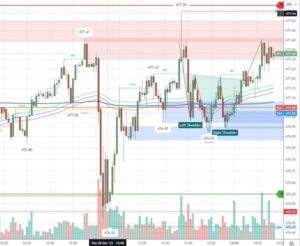Day trading is a challenging and fast-paced activity requiring high skill and discipline to buy and sell stocks, currencies, and commodities within a single trading day. To succeed at day trading, traders must understand the market deeply, make quick decisions, and manage their emotions effectively.
One of the most effective ways to improve your day trading skills is through deliberate practice. It is often not considered in most industries, so the stock market is also on that exceptional list; however, some consider it deliberate practice and excel. Deliberate practice is focused and feedback learning that involves intensive focus and repeated effort over an extended period. It is a process of breaking down complex tasks into smaller components, identifying weaknesses, and working to improve them.
Here are some tips on how to incorporate deliberate practice into your day trading routine:
- Set Specific Goals: To maximize your practice time, you must set specific goals aligned with your trading objectives. For example, if you want to improve your risk management skills, your goal could be identifying and managing risk in every trade you make.
- Journal Your Trades: Journalling is always underrated; if you look at sports nowadays, they review each game and player’s strengths and weaknesses. We need to do the same way: Journal your entry and exit, position size, mistakes, wins, why you took the trade, what pattern you saw, how your emotions were, and the outcome. Journalling helps you identify the patterns in your trading behavior, and you can adjust daily with a feedback loop.
- Analyze and Feedback Your Performance Daily: Review your trading journal and analyze your performance at the end of the day without fail. Look for areas where you can improve and identify the repeating behavioral patterns hindering your progress.
- Focus on One skill at a Time: Deliberate practice suggests focusing on one skill at a time and practicing it until you have mastered it. For example, if you want to improve your ability to read charts for one month, focus on that skill until you can analyze price action. The other example is that you can choose one technique you want to master until you get used to it.
- Get Feedback: Seek feedback from other traders and experts in the field. Join trading communities and forums, attend trading conferences, and seek out mentorship opportunities. However, the financial world comes with a price nobody teaches for free. There are free resources on the internet, but free always comes with a big question: How accurate is the information?
In conclusion, Deliberate Practice is a powerful tool that can help you master the art of day trading. By setting specific goals, recording your trades, analyzing your performance, focusing on one skill at a time, and seeking feedback, you can improve your skills and become a successful day trader. Remember that day trading is a continuous learning process, and deliberate practice is a vital part of that process.
We will go into more detail about what and how to learn and apply deliberate practice in stock market day, swing, and long-term trading.



